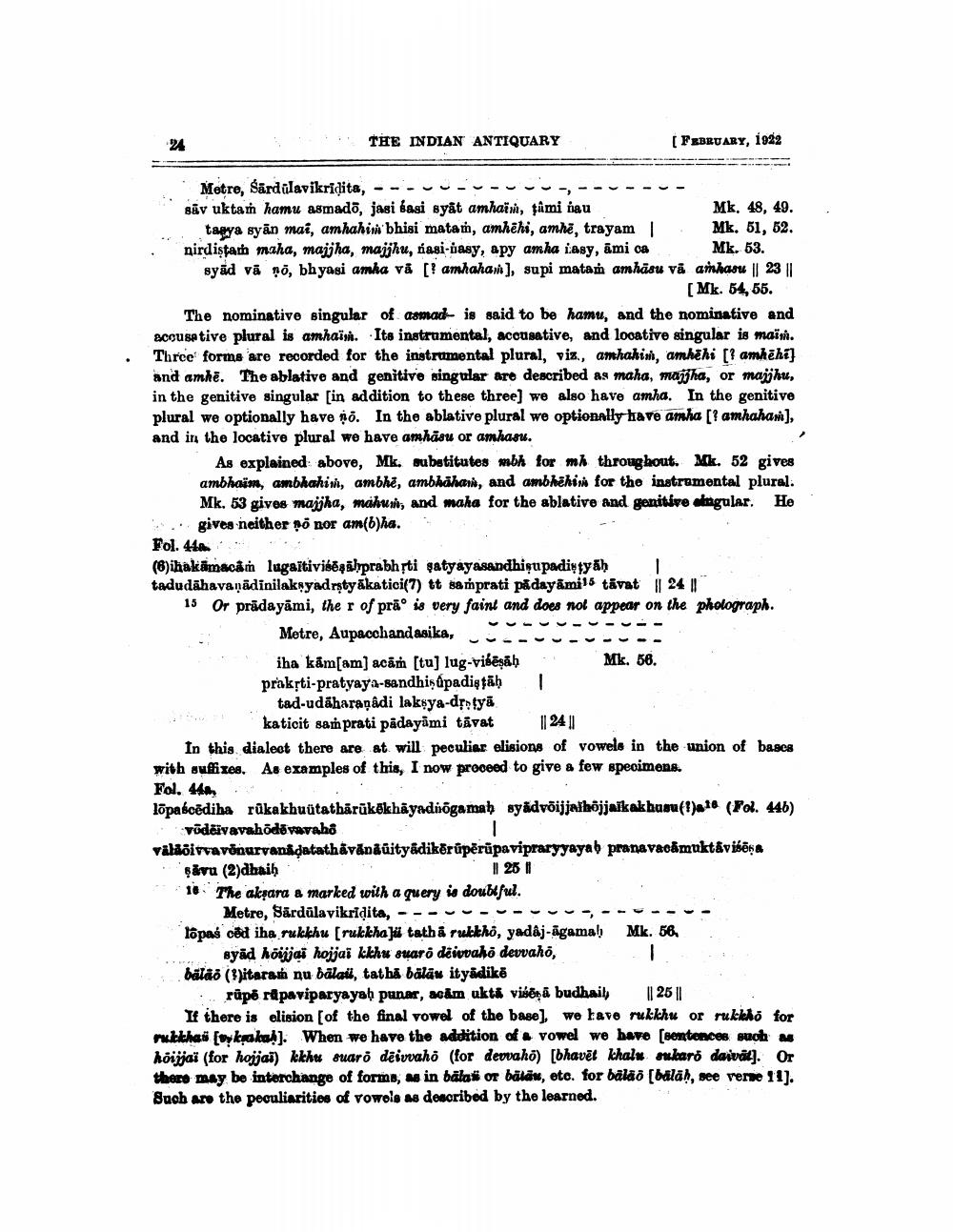________________
THE INDIAN ANTIQUARY
[ FEBRUARY, 1922
Metre, śārdülavikridita, --- ---
------- sav ukta hamu asmado, jasi sasi syat amhain, tâmi iau
Mk. 48, 49. tanya syan mai, amhahir bhisi matam, amhēhi, amne, trayam . Mk, 51, 52. nirdistath maha, majjha, majjhu, nasi-tasy, apy amha iasy, ami os M k. 53. syād vā no, bhyasi amka vå [ amhahan), supi matam amhāsu vă amharu || 23 ||
(Mk. 54, 55. The nominative singular of asmad is said to be hamu, and the nominative and accusative plural is amhaish. Its instrumental, acousative, and looative singular is maïna. Three forms are recorded for the instrumental plural, viz., amhahish, amhëhi [? amhēhē} and amhe. The ablative and genitive singular are described as maha, majjha, or majjhu, in the genitive singular (in addition to these three) we also have amha. In the genitive plural we optionally have no. In the ablative plural we optionally have amha [? amhahan), and in the locative plural we have amhäsu or amhasu.
As explained above, Mk. substitutes mbh for mk throughout. Mk. 52 gives ambhajm, ambhahin, ambhe, ambhdhart, and ambhëhis for the instrumental plural. Mk. 53 gives majjha, mahusis, and maka for the ablative and genitive angular. He
gives neither no nor am(b)ha. Fol. 4-left
: (6) ikäkämacam lagaitivihopālprabhști çatyayasandhiņupadiyyah tadudāhavaqadinilaknyadrsty.katici(7) tt samprati på dayāmis tävat | 241
15 Or prādayāmi, the r of prā° is very faint and does not appear on the photograph.
iha kām[am] acāṁ (tu) lug-vibēşāh Mk. 58. prakti-pratyaya-sandhişúpadieţāh I
tad-udáharapadi laksya-dro tyā
katicit samprati pådayāmi tävat || 24 || In this dialect there are at will peculiar elisions of vowels in the union of bases with suffixes. As examples of this, I now proceed to give a few specimens. Fol. 444 lopascēdiha růkakhuütathārükökhayadrogamah syadvõijjalhöjjaikakhusu(1) 16 (Pol. 446)
vůdčivavahodovavaho viláõivvavónurvanädatathāvānäüityädikêrūpērüpavipraryyayab pranavacämuktavibēka savu (2)dhaih
1 251 18 The aksara a marked with a query is doubtful.
. . marked wilh a query is doubtful. Metre, Sārdālavikridita, --- - -
- -- - lopas cd iha rukkhu [rukkha tatha ruckho, yadâj-agamah Mk. 56.
syäd höjjai hojjai kkhu swaro deivvaho devvaho, balão (litarah nu bälai, tatha bälās ityadikë
rupo rapaviparyayab punar, acām ukts visēra budhail | 26 | If there is elision (of the final vowel of the base), we have rukkhu or rukkho for mutkhat (vykpakah]. When we have the addition of vowel we have [sentences maoh as kõijjai (for hojjai) kkhu suarò deivvaho (for devvaho) [bhavēt Khalu sukaro daival]. Or there may be interchange of forms, as in balai or balau, etc. for bålão (balah, see rene 11). Such are the peculiarities of vowels as described by the learned.




